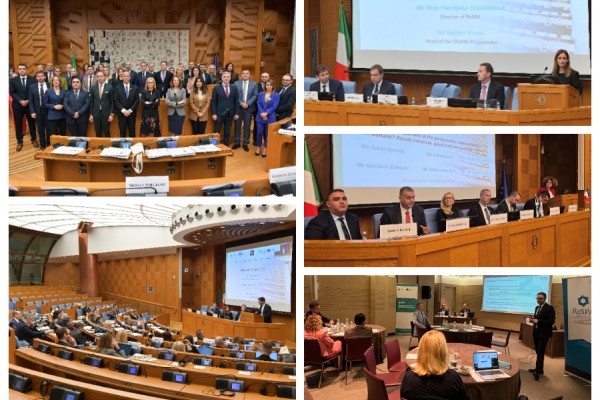
Regional Conference on Parliaments and Evidence-Based Lawmaking: Lawmaking is one of the core functions of our parliaments and is the bedrock upon which our democracies stand
17-18 October 2024, Rome, Italy
A high-level regional conference titled "Parliaments and Evidence-Based Lawmaking in the Western Balkans: Challenges and Opportunities", crafted in collaboration with the Italian Chamber of Deputies and partnership with SIGMA Programme, brought together senior officials, experts, and parliamentarians from the Western Balkans, the European Commission, the Italian Chamber of Deputies, and European Parliament Research Services to exchange and share insights and best practices on enhancing the planning and organisation of parliamentary scrutiny of legislation; building effective legislative planning processes and improving collaboration between parliaments and governments.
One of the conference's key messages was that evidence-based lawmaking is more than a procedural requirement - it is a safeguard for the quality of governance, the rule of law, and, ultimately, citizens' trust in their elected representatives. As the Western Balkans move toward EU accession, parliaments in the region must be equipped to handle complex legislative agendas, often involving highly technical EU acquis. The ability to draw from regulatory impact assessments, public consultations, and stakeholder engagement is crucial.
Director HANDJISKA-TRENDAFILOVA underlined the importance of the parliaments and evidence-based lawmaking in the Western Balkans, especially when “demands for effective governance, accountability, and public trust have never been higher. Lawmaking is one of the core functions of our parliaments and is the bedrock upon which our democracies stand. And evidence-informed lawmaking ensures that this bedrock is strong but also adaptable to the needs of our citizens, responsive to global challenges, and aligned with the transformative ambitions of EU integration. Addressing the situation in the region, Handjiska-Trendafilova noted that parliaments in the Western Balkans have increasingly recognised the value of legislative decisions that are informed by data, research, and transparent processes. Yet, challenges remain, and thus, “that is why the legislation we adopt truly aligns with both national priorities and EU standards requires us to rethink our approaches to legislative planning, scrutiny, and implementation”, concluded Handjiska-Trendafilova.
Throughout sessions, participants explored vital questions such as: How can we better plan and coordinate our legislative agendas? How can we ensure parliaments have timely access to the information they need to scrutinise draft laws? And importantly, how can we use new technologies like artificial intelligence to advance evidence-based lawmaking?
Participants also acknowledged these challenges and sought solutions collaboratively, discussing with distinguished officials from parliamentary administrations and policymakers and experts from the Western Balkans, and the EU, who shared their insights on how the Western Balkans can enhance legislative processes and build stronger connections between parliaments and governments.
Ahead of the Conference, representatives of DG NEAR, SIGMA and ReSPA discussed with the participants, in an informal setting, the ongoing and planned projects and initiatives in the area of lawmaking and legislative scrutiny. Genti XHAXHIU, ReSPA Programme Coordinator, presented ReSPA activities and the available direct support instruments by the end of the year.
In this context, ReSPA has been supporting administrations in addressing these challenges. From capacity-building programs to fostering peer-to-peer learning across the region, ReSPA is committed to enhancing the expertise of civil servants and ensuring that administrations are equipped with the necessary tools and skills. The conference was yet another step in shaping the future of parliamentary oversight in the Western Balkans and strengthening the region’s collective effort toward EU integration.



